An Atlantic Odyssey By S.V. Dáte From behind us, a slight breath of air brushed
my cheek. I pretended not to notice. I stretched up on Sounion's
cabin top and looked all the way around: once again, absolutely nothing.
Even the surface was still, oily flat save for a barely perceptible
six-foot swell from the north. The two previous days of thick cloud and cold drizzle had given way to clear skies and, alas, no wind. Behind us was, except for the scattered volcanic peaks of the Azores archipelago, nothing but 2,500 miles of blue water all the way to Rhode Island. Ahead, it was 700 more miles to Lisbon, and 900 to our destination, Gibraltar. We only had enough diesel to motor 300 of them. I thought again of my dream: to sail to Europe, through the Pillars of Hercules, into Homer's wine dark Mediterranean. I thought how, ever since we'd left Florida, that had evolved: we no longer crossed an ocean; we just tried to move 100 nautical miles a day, a mere half-inch on that small-scale chart, "North Atlantic Ocean, Southern Sheet." That day, halfway between Bermuda and the Azores when we'd flipped the folded chart onto its second half, had been a major celebration. We'd enjoyed a scarce Coca Cola with dinner, even though it wasn't a "Coke day." I again studied our little boat: 31 feet from stem to stern. She was the first boat we'd ever owned, and she'd seemed so big in her slip on the St. John's River where we'd bought her. But there, out in the middle of nowhere, a point definable only by its coordinates -- 39 degrees, 23.1 minutes north, 23 degrees, 46.7 minutes west -- she was thoroughly insignificant. Indeed, no American insurance company would touch her for a transatlantic passage. Lloyds of London wanted almost 10 percent of her value for a single year's premium. Because the bank owned most of Sounion, not us, we had to find insurance. We settled on a German company that specialized in small sailing yachts by requiring high deductibles. I turned back astern, and the zephyr had become an honest breeze, audible as it blew past my ears. I sprang into action, and soon had the huge, rainbow striped spinnaker sail out on one side, and our largest genoa out on the other. We were back in business, as Sounion began
surging along amid the little waves building from behind. If we kept
it up
through the afternoon, we might even be able to salvage 55 or 60 miles
for the 24-hour period: only a quarter-inch on the chart, but better
than nothing. We would make Gibraltar by the end of July! And what
day was it? The 24th? Yes! An even-numbered day: a "Coke day." Yes,
indeed: life was good. From May 1994 to May 1995, our 31-foot cutter took us all the way to Puerto Mahon on the Mediterranean island of Menorca before we turned around. Our return took us across the tropical Atlantic on the Trade Wind route to the Caribbean chain, through the Bahamas, and finally back to Cape Canaveral. It was an ambitious itinerary, 11,500 nautical miles, much more travel than most cruising sailors would attempt in a year. But we weren't typical cruising sailors; we only had one year, while most cruisers are out five, seven, 10 years, or indefinitely. Many we met, particularly in the Med, thought us daffy for crossing the Atlantic twice in one season. Many at home thought us daffy for going at all: forsaking good jobs and homes, and for what? If you want to go to Europe, take a plane.... For people who thought like that, there could never be a satisfactory explanation. At its heart, this was a romantic adventure, a journey of the spirit as much as the body. And because of that, it had to be the sea. A mountain can be forbidding, a forest serene, a swamp mysterious. But only an ocean musters the unfathomable emotions that mesmerize us and make us stare at the breakers, hour after hour. She is unreasoning, all powerful and capricious. Even the mightiest freighter can't survive her worst storms, yet a tiny raft can safely cross, given her good graces.
We stopped eating out, stopped taking vacations, stopped watching television. We started reading books, spent every weekend working on, fixing, maintaining, learning about the boat. We saved our money. When the time came, we asked for leaves of absences from our jobs. We got them, and it was nice to have a paycheck to return to, but we would have gone anyway. That, really, was the only difference between us and the dozens of would-be sailors we've met before, during and after the trip. I know many others who are far better mechanically inclined than me (the sine qua non cruising attribute; cruising is 5 percent sailing, 95 percent fixing things that break); others who have far more disposable income. Many say they want to chuck it all and drop out, at least for a while: sail around the world, kayak in Alaska, buy a Jeep and drive the Pan American Highway. What's keeping them? Fear. Not fear of drowning, or hypothermia,
or anything so real. Fear of losing what they've got. I understood
this anxiety quite well before we left; it almost kept us from going.
I don't understand it anymore, because now I know there's so much more
out there than I ever imagined. Indeed, now I fear not going
again. Weren't you scared? I never know what's in question: my honesty or my sanity. Of course there were times when we were scared. If you're not scared of the ocean, and what she can do, there's something wrong with you. A storm at sea has to be experienced to be believed. With no hills or trees to slow it, the wind howls incessantly, whipping up towering walls of dark, malignantly green water. White foam flies everywhere. Returning to Gibraltar from Menorca, we were caught out in a severe gale -- a Force 9, where Force 10 is a full-fledged storm and Force 12 is a hurricane. We'd never heard the number nueve in a Spanish weather forecast before. I remember how dry my mouth got. By morning, the waves were 25 feet high; large enough to send solid, green water over the bows and down the decks of the big tankers that plowed into them; large enough to send spray a hundred feet into the air when they smashed against the eastern face of the Rock; large enough that a Navy P-3 Orion on maneuvers from the Royal Air Force base there flew overhead to ask if we needed help. If you go to sea in a small boat, you need to be scared. It's what keeps you alive. But it's a more honest fear, I think, than those we live with at home. If a rogue wave capsizes your boat, it's part of the natural scheme of things. A tractor trailer jack-knifing in front of you on I-4, or a drunk driver running a red light, or a drug-crazed thug gunning you down at the convenience store: these are "natural" only in our twisted society. Yet we accept these risks each day. And in return, we get to have car payments, rush-hour traffic, a mortgage, fast food and prime-time television. For a year, we lived for a different set of rewards. We've watched dolphins playing at our bow, leaping and spinning, seemingly competing in their acrobatics. At night, they would leave shimmering phosphorescent trails as they swam in double-helix formation beside and beneath us.
We've marveled at bronze-age monuments on Menorca in the Spanish Balearics, so mysterious that archaeologists still puzzle over their meaning, yet so common that there are no fences or ticket takers. They are out in farmers' fields, open to everyone. We've seen the green flash, a rare emerald blink when the sun sets through a perfectly clear sky and over a uniformly flat horizon. We've also seen days of Sahara Desert dust so thick it almost obscured the sun's disk. We've spent weeks anchored off remote Caribbean and Bahamian
islands, reading, writing, swimming, snorkeling. We could have stayed
there forever, catching rainwater and living off the lobster, conch
and fish. Se faz favor. Please. Obrigado. Thank you. Bom dia. Good morning. Boa noite. Good evening. The rest of the world, we learned, puts great value in such greetings. So much so, that to start a conversation without one is rude. As best we could, we tried to learn the language of each place we visited. From Bermuda to the Azores, we read books and listened to tapes on Portuguese. From the Azores to Gibraltar, we learned Spanish. And before we went to Martinique in the Caribbean, we tried to learn French. Such was the paradox of the entire year. Before we left, and now that we're back, it's hard to imagine finding time in a day to learn a new language. Yet on passage aboard Sounion, we made the time, despite frequent sail changes, rigging inspections, cooking and cleaning and the often wearisome watch keeping schedule. In port, we kept regular hours, but still had just as much to do. In retrospect, the year went by quickly. Yet there hasn't been another time in our lives when we learned as much, saw as much or worked as hard. Simple things like getting cash or calling home became hours-long adventures. Finding a bank with a favorable exchange rate or learning the local phone system meant pulling out your dictionary and memorizing a new, specialized vocabulary. Need groceries? First prepare the dinghy, take it in to shore, find a place to tie it, buy your food, haul it back to your dinghy, shuttle it to the boat and stow it aboard. In many parts of the world, there is no supermarket, and a grocery run involves visits to the butcher, the green grocer, the baker and a general store. A lot more inconvenient and time consuming, but worth it. Vegetables that have never been refrigerated taste better than what you buy in a produce section. And the flavor of fresh bread alone -- every country save ours seems to have a national bread, baked and eaten daily -- is reward enough. It hasn't rained and you need fresh water? Get out the six-gallon jugs and toss them in the dinghy. You may need several trips. Even our idyllic, self-sufficient life in the Bahamas
required plenty of time and effort. Finding, catching, cleaning and
cooking your food, of course, requires more time than taking it out
of the freezer and popping it in the microwave. Sometimes, preparing
meals consumed a large portion of the day. Of course, nothing compares
to the taste of grouper that was swimming under the boat at 11 a.m.,
and served up, steaming hot, at 11:45....
The words are spoken with a twinge of jealousy; it's a tone we've heard often since our return. Usually the person hasn't any idea what life on a small sailboat is like. They imagine us sipping cocktails as a balmy breeze pushes the boat over a glassy, turquoise sea. A paid crew does any actual work that might arise. It's the most difficult thing we've ever done, I say somewhat defensively. Yeah, but you're so lucky to be able to take a whole year off; I wish I could do something like that.... As if my bosses came to me with a pile of money that was lying around and told me to buy a boat and go have fun for a change. At this point, I usually smile and agree, yes, we are lucky. Truth is, of course, that we were lucky, extremely lucky. We had our health, and we both had jobs that allowed us to save a little money each month. But, like most people, neither of us brings home a particularly high salary. On those few occasions that people press the point that such a trip is something they've always dreamed of, I ask why they haven't gone. I just don't have the money. Really? How many times do you go out to dinner a week? How new is that car you're driving? I don't know much about sailing. When we started, neither did we. It takes hundreds of hours of reading books on yacht design, seamanship, navigation, diesel engine repair, et cetera, et cetera. I don't have that kind of free time. No? Did you catch "Seinfeld" last week? How about "E.R."? It's amazing how much time there is in a day when the TV isn't turned on. I don't know.... And so ends the conversation. Once in a while, we come upon someone who listens to our tales with a look not so much of jealousy, but of wonder and enthusiasm. I can almost see the mental calculator, adding up assets and debts, estimating savings rates.... Can you do this? Almost certainly. Can you do this easily? Unless you're independently wealthy, an accomplished mechanic and a seasoned merchant mariner, almost certainly not. The sea is one of the last romantic places left in this crowded, communications-crazy world. Nowhere are you more alone than the middle of the ocean, on a vessel smaller than your living room. The question of saving for the trip, buying the boat, learning how to sail the boat: these are practical matters that can be overcome with practical behavior. But casting off those lines and leaving the sea buoy behind requires something else, something not particularly valued in today's consensus-oriented corporate society. At sea, you are quite literally the captain of your own destiny. When and if you make your next port safely is entirely up to you. There are no deadlines to beat (except those Nature imposes), no quotas to make, no meetings to attend. There is no boss to get on your case. But, other than your crew, there are no co-workers to bail you out. If you get injured, there's no 911, no paramedics 3 minutes and 17 seconds away. Freedom and responsibility are intertwined; you can't
have one without the other. It says so right in the grade school civics
book. That's hard to remember in a world of police, courts, taxes and
welfare. It's quite easy to understand in a driving gale, with 15-foot
waves slamming against the hull and washing over the deck. Did you
lash everything securely? Are the storm sails set? Did you remember
to catch the 5:30 a.m. weather forecast? Did you inspect the rigging
before you left your last port? Whose fault is it if you didn't?
At home, our air-conditioned, car-to-office-to-car-to-home lifestyles have largely made Mother Nature irrelevant. The smiling weatherman says take an umbrella today, so we do. On the water, the rhythms of nature set the parameters for day, week and season. You wake with the sun, and go to bed not too long behind it, because electricity is a precious commodity. No need to waste it burning lights when daylight is free and ample. When it's dry, you varnish the teak and wash the clothes. When it rains, you collect drinking water and read. If you need to catch dinner, your best chance is within an hour or two after low tide. You learn patience; you have to, for if you don't, you'll go mad. When the boat only carries enough diesel to motor 450 miles, and the next harbor is 1,850 miles away, clearly you're at the mercy of the wind. And if, with port still 1,400 miles away, the wind dies for a day, or two, or three: you sit, and wait, and read, and fish, and read, and wait. Coming from a world where we jealously guard every moment of our time, for there never seems to be enough of it, the first calm can be terribly frustrating. I can't describe how often I stared at the chart on the way from Bermuda to the Azores, a route notorious for fickle winds and frequent calms. Some days we managed less than 50 miles. On a couple, we barely made 20. You learn safety; not just big safety, like having the right equipment, but little safety, like thinking through whatever task was at hand before starting it. Any time Sounion was on passage, everyone on deck wore a safety harness, with a tether attaching it to one of two nylon straps that ran the length of the deck. On a shorthanded boat, falling overboard usually means death: to stop the boat, turn her around and then find a basketball-sized head amid three- or six- or 10-foot waves by yourself is difficult if not impossible. At night, it is impossible. These lessons, once learned, stay with you. Before the trip, I drove around in a little sports car, in a matter befitting the owner of a little sports car. I would go typically go 5 to 10 miles over the limit, knowing I was unlikely to get a ticket for those speeds. Now, in a used pickup, I drive at the limit, or (especially
on the freeways) about 5 miles under. This is partly because it's safer
(a blowout at 60 mph will be far less dangerous than one at
75 mph) and partly because: what's the rush? A difference of 10 mph
at highway speeds over an hour translates to 10 minutes. It's hard
to convince someone who has spent days watching the speed gauge sit
at 1 or 2 knots, or even at zero, that a few minutes one way or the
other makes a difference.
The image of the happy-go-lucky sailor notwithstanding, you must become rigidly organized and brutally self-disciplined. You will have to get out of debt, and save enough money for boat payments, insurance payments and living expenses for the whole year, or for whatever period you plan to go. You have to make a long-term budget and schedule, and stick to it. We've met quiet a few dreamers who always seem to be three to five years from leaving, or, worse, who plan to leave "someday".... How much money to save? As much as you possibly can. You cannot legally work in other countries without a permit, which, as a "yachtie" you aren't going to get. You can probably barter services with other yachties (e.g., you patch his sail, he'll re-wire your electrical panel), but don't expect to earn much abroad. (We did meet one public relations consultant in Spain who worked for clients back in the States using her laptop and a modem.) How much for living expenses? That item can be flexible. We budgeted $200 a week, and found we could live extravagantly, with two or even three dinners ashore. We met an English couple managing quite well on $80 a week, and that included putting $30 a week into the emergency fund. Finally, if you're rich enough to buy the boat outright instead of on time, do it. It gives you a lot more flexibility, not the least of which is the ability to never come back. You will have to read, at least an hour or two every night. Read about fixing things on your boat; you won't be able to afford anyone to fix them for you. Read about the places you want to go. Read other sailors' personal accounts of their trips, and what they learned. Between one and three years before departure day, buy the boat. By then, you will know what makes a good ocean-going yacht and what doesn't. You will have researched the market and will know a good value. After you buy the boat, use the boat. Take her out, in good weather and especially in bad. Learn how she behaves in a gale, how best to deal with the ferocious wind and seas. Find her leaks, and fix them before the big trip. A word of caution: merely owning a boat is terribly expensive. Loan payments, insurance and marina fees add up. This will make a big dent in how much you can save each month; plan for it. What about kids? Take them. The children we met on other boats were the most mature, inquisitive and well-adjusted we've ever met. They didn't know the latest MTV videos, but they did know how to fish, dive, sail, navigate, and speak in one or two other languages. And they read. Voraciously. Most had a rigid curriculum of onboard study from their home country. As long as they have a strong, healthy, rational fear of falling overboard (age 5? 6? 7?), they should be okay. Finally, we advise them, before you do any of this, you
must call the cable company, and tell them you want to unplug. Not
only will you save $30 a month (that's $360 a year; equivalent to a
new GPS navigation unit, or a good set of foul-weather gear, or 400
feet of good dock line, or about 1,000 cans of tuna, on sale at Publix),
but you can't afford the time anymore. Not if you're serious. One of the nicest things about the sea is that you don't run into any office politicians. When the wind starts to whistle, the spray flies and the rigging creaks, there is, after all, no one's butt to kiss, and God help you if you're unprepared. Maybe because of this, you'll never meet anyone as fiscally conservative yet socially liberal as a yachtie. Fiscally conservative because they can't afford to be otherwise. Most are on a finite budget, and will not go anyplace that charges what they consider an unreasonable fee. (These, obviously, aren't the sort of yacht owners who tie up at Pier 66; they're the sort that municipalities up and down Florida are trying to prevent from anchoring in "their" stretch of the Intracoastal Waterway.) Anguilla wants how much for a cruising permit? Forget it. We'll visit in another lifetime. A $40 overtime fee for clearing in after hours? We'll just stand offshore tonight and enter in the morning. Socially liberal -- libertarian, I guess -- because they don't care one bit how others choose to live, so long as those others (or their governments) don't infringe on their right to live as they please. Which is not to say they are aloof. On the contrary. Unlike tourists who fly in to their luxury hotels or roll off the cruise ships, yachties actually meet real locals. They make an effort to learn the language. They have to. They can only afford to eat what the locals eat. And besides, that was the whole point of the trip wasn't it? To meet the rest of the world? And to one another, they are almost family. Need a peculiar-sized wrench? Or some help understanding a radio schematic? Some brute force to free a snagged anchor? You won't have to ask twice. When we had to remove the stainless steel railings from Sounion in the Azores to have them rewelded, no less than half a dozen other yachties volunteered tools, advice and assistance to loosen the stubborn, corroded nuts. After we spent a terrible night in Flores dragging our anchors, an Englishman named Roger dove on our 30-foot-deep anchors in 55-degree water (it was warm by his standards) to inspect them for us. When I was alone for a month in Union Island while Mary Beth went home to work, I caught a slight cold and stayed aboard for a couple of days to recover. On the second morning, an elderly German fellow and his wife swam over to knock on the hull. They hadn't seen me out and about, they said, and just wanted to make sure I was alright. Fiercely independent and strong-willed, yachties did
not, as a rule, do well in an organized workplace. When they disagreed
with their bosses, they had no qualms about telling them so. Such behavior
curries no more favor in Britain, Denmark, Germany or Australia than
it does in the United States. The first chance they got to leave, they
took. Most have never looked back.
In truth, this was a major concern. Most people can get along with anybody for a short period of time, and in an adrenalin-charged environment like the start of the first long passage, we make great allowances for personality traits that we don't particularly care for. But when things settle down, and there aren't any crises to deal with, the mannerisms we might have found amusing earlier gradually become grating, even despicable. If he tells that joke one more time, I swear I'll.... As the months passed, as Mary Beth and I grew more accustomed to handling the boat ourselves, we came to prefer not having any other crew at all. And conversely, our crew probably began to feel less and less vital to the success of any given passage. When people don't feel important, they're more apt to become lazy, argumentative and sloppy: three characteristics that don't work on a small boat at sea. And when it was just the two of us? Apart from one isolated incident along the Costa del Sol when I was threatened with a pair of Vice Grips for thoughtlessly standing around and not helping her with an armload of docklines, we got along easily, probably because our personalities already lent themselves to this new lifestyle. We're both flexible introverts: welcome to company and conversation but equally content to read. Thirty-one feet from stem to stern is not a lot of room, but even aboard Sounion we had enough separate areas for time alone. The little seat on the bowsprit, the foredeck, on top of the boom, the forecabin and the main cabin. When I worked below, Mary Beth would often go up top and read, and vice versa. When bad moods struck (and they would, occasionally, just like on land), though, we would have to take extra care to avoid dragging the other person down as well. Why, exactly, was I in a bad mood? Was it because the world had wronged me? Or had I done something stupid? It wouldn't take much thought to realize how silly it was, and I would get over it. Sometimes, though, I would forget. Once, we were anchored in the Abacos, not far north of Green Turtle Cay, in an absolutely spectacular cove. Yet I was in a foul mood, and screamed something to the effect that nothing was going right. Mary Beth blinked, told me to look around and to explain what part of "this," exactly, was so thoroughly wrong. She was, of course, absolutely correct, and I was ashamed
of myself. Fortunately, though, moments like that were the exception,
and for the most part we lived each day knowing we were doing something
we'd worked years for, something many others only dreamed about. The most peculiar things sometimes bring back vivid memories, then a wistful smile. The can of shaving cream I have, I noticed recently, is marked in five languages: typical of things made to be sold in Europe. I bought it in a tiny shop in Gibraltar's Spanish ghetto. I pulled it down from a shelf and put it on the counter, and the little old lady told me, in Spanish, that she couldn't see very well, and would I please tell her the price. I counted out the English coins and put them in her palm. Gracias, señora. Buenas tardes. The other day, I was leafing through a book and saw a photo of the Alhambra, the ancient Moorish citadel in Granada, Spain. I remembered the train ride up the coastal plain and through the Sierra Nevada. The walk through that bustling city and up the hill. I remembered standing there amid the intricate plaster work, in the "Ambassador Room," where, 500 years earlier, the Catholic Queen, Isabella, had received Christopher Columbus upon his return from the New World.... Sounion is for sale, now. With a wedding coming up and, we hope, children, a house will be more practical for the next part of our lives. So each weekend, we drive out to the coast: sandpaper, paint and polish in hand. She already looks prettier than we've ever seen her. We've befriended a couple hoping to leave on their boat this winter. They're going through the same things we went through two years ago: balancing full-time jobs with the oppressive weight of repairs not finished, inspections not performed and gear not purchased. I can't help but feel envious. Occasionally, they come by to see how Sounion is looking, and marvel again that she crossed the Atlantic. I allow myself a moment of admiration: That she did, didn't she.... I miss all of it: the endlessly clear nights full of stars; the magical places, the next one always over the horizon; the welcoming smiles that seemed to ask, "What took you so long?" I even miss the moments of pure terror when foaming, gurgling walls of water would rear their terrible heads and come crashing down onto the deck. I've never felt more alive. We came home to a place that feels more foreign than any we visited. I felt it even as we motored between Port Canaveral's jetties and tied up at our familiar dock. There were the same charter boat skippers, the same dockhands, the same weekend fishermen bitching and moaning about the same things. Nothing had changed. Here we were, feeling we had seen, and learned, and grown so much, and brimming with news that yes! the world was a wonderful place, and we'd returned to the same-old, same-old. Around us, America is obsessed with the latest, the newest gizmo to enrich our lives -- CD ROM, larger-screen TV, 4-head, stereo VCRs, interactive this, online that, with no end in sight. For all our massively expensive efforts to amuse ourselves, are we any happier than the Azorean family walking along the waterfront on a cool summer evening, or the elderly Spanish couple enjoying a late evening meal of paella marisco at the seaside cafe, or the Union Island villagers who, en masse, set their radios in their windows each Friday night and dance in the street to a reggae beat? Someday, we know, we'll go again. Mother Earth is pretty
big, when you wander upon her on a small boat, and takes some time
to see her. We'll make that time. With our plans for a family, it may
take 10, or 12 or 15 years before we can do it, but we'll get there.
We know we can.
|
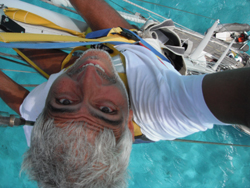 |
|||
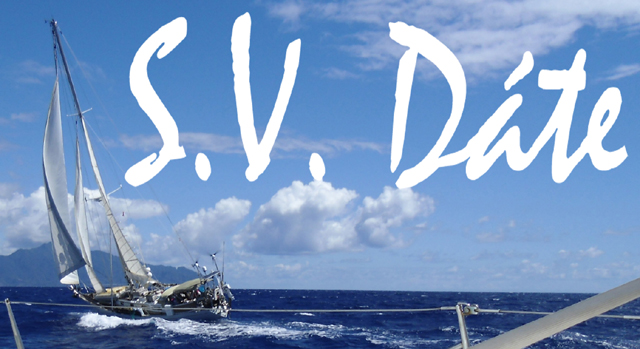
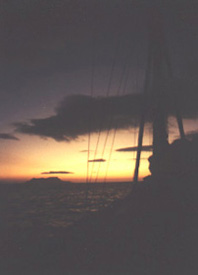
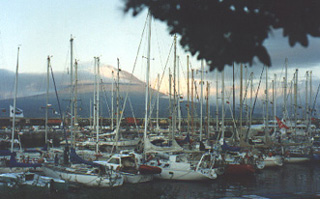 In
the spring of 1992, my fiancee and I decided that if we were going
to do this, it had to be soon, not in five or 10 years. We wanted to
start a family, and who knew what the future would bring? If we didn't
go when we had the chance, we might never go. And so we did.
In
the spring of 1992, my fiancee and I decided that if we were going
to do this, it had to be soon, not in five or 10 years. We wanted to
start a family, and who knew what the future would bring? If we didn't
go when we had the chance, we might never go. And so we did.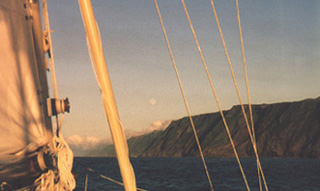 We've
climbed volcanoes on the mid-Atlantic ridge, then accepted the hospitality
of the friendliest people in the world: the Azoreans. One lent me his
car so we could drive around the island; others invited us to their
homes for dinner.
We've
climbed volcanoes on the mid-Atlantic ridge, then accepted the hospitality
of the friendliest people in the world: the Azoreans. One lent me his
car so we could drive around the island; others invited us to their
homes for dinner.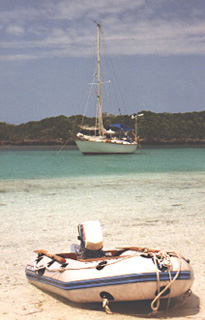 Must
be nice.
Must
be nice.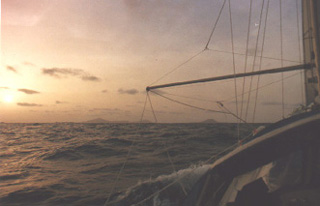 The
sea changes you. More accurately, I guess, living day in and day out
with such things as the wind, the tides and even the phases of the
moon thoroughly alters your perspective on life.
The
sea changes you. More accurately, I guess, living day in and day out
with such things as the wind, the tides and even the phases of the
moon thoroughly alters your perspective on life. So,
the persistent ask, if I wanted to do this, what do I need to do? Already
I'm hesitant, because most people who are serious about going know
exactly what they need to, and ask us for specific advice and general
encouragement that, yes, it can be done, and, yes, it was worth it.
Nonetheless, I tell them:
So,
the persistent ask, if I wanted to do this, what do I need to do? Already
I'm hesitant, because most people who are serious about going know
exactly what they need to, and ask us for specific advice and general
encouragement that, yes, it can be done, and, yes, it was worth it.
Nonetheless, I tell them: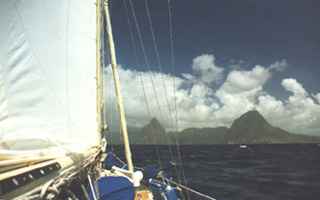 If
I was alone on a boat with just my wife for a year, I'd kill her.
Or she'd kill me....
If
I was alone on a boat with just my wife for a year, I'd kill her.
Or she'd kill me....